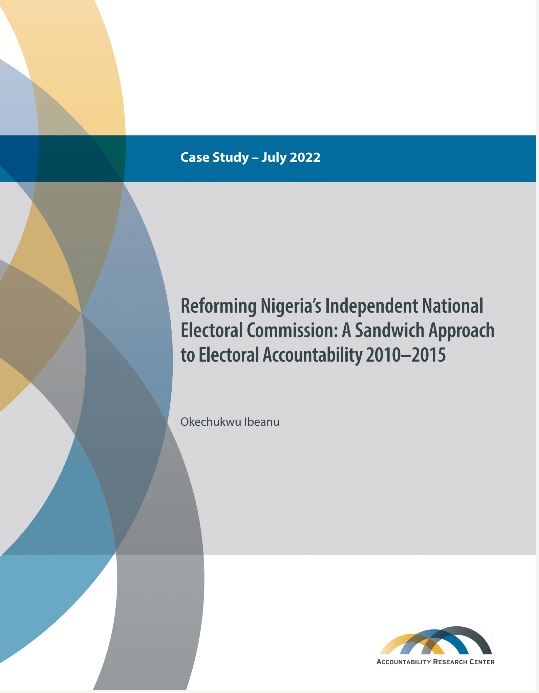
Reforming Nigeria’s Independent National Electoral Commission: A Sandwich Approach to Electoral Accountability 2010–2015
Date: July 2022
Author(s): Okechukwu Ibeanu
Publication type:
Published by: Accountability Research Center
“Sandwich strategies” are interactive processes in which reformers in government take tangible measures that reduce the risks of citizen action from below, driving virtuous circles of mutual empowerment between pro-accountability actors in state and society. This case study is one of a set of 18 published here, which are among those included in comparative analyses of whether and how sandwich strategy initiatives drive institutional change.
Nigeria has a history of very difficult and contentious elections. Practically every election has been perceived as marred by poor organization and electoral malpractices. These challenges are attributable to weak institutions, including weak legal frameworks; poor political culture among both voters and politicians; lack of respect for rules; and excessive use of money, especially to bribe voters and electoral agencies. Electoral reforms in Nigeria over several decades have tried to address these issues.
Electoral reforms in Nigeria for many years targeted improvements in the administration of elections and management of the electoral process. However, following the 2007 elections, deemed unfair by both international and Nigerian observers, the president of Nigeria appointed an Electoral Reform Committee, some of whose recommendations flowed into the 2010 Electoral Reform Act. A new chair of the Independent National Electoral Commission (INEC) began implementation of the Act and a broader reform agenda that focused not just on election management, but more broadly on electoral governance. This case study reflects on this shift towards including citizens in monitoring elections.
INEC took two key steps to facilitate greater citizen monitoring of elections. First, it used university staff as residential electoral commissioners and incorporated members of the large, official National Youth Service Corps into election activities. Second, it stopped funding election monitors and set up a transparent process to accredit independent CSOs as monitors. Although some INEC commissioners as well as politicians resisted these changes and other reforms, these steps helped improve the transparency of Nigerian elections, as well as increased people’s faith in INEC.
Okechukwu Obinna Ibeanu is a Professor of Political Science at the University of Nigeria, Nsukka with extensive experience of environmental and social issues. He obtained his PhD from the University of Nigeria, where he has also been the Dean of the Faculty of the Social Sciences, Director of the Institute for Development Studies, and the Dean of Postgraduate Studies. He was the Special Rapporteur of the United Nations Human Rights Council on the human rights impact of toxic wastes. He recently completed a five-year tenure as National Electoral Commissioner at the Independent National Electoral Commission of Nigeria.
